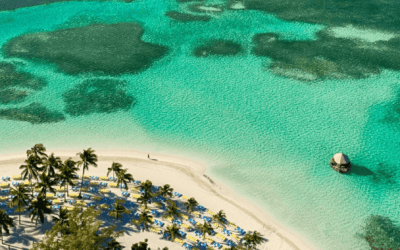Here at Nomad Capitalist, we frequently discuss the idea that governments thrive on taxing the ‘evil rich.’
Such conversations inevitably raise the question of whether a financial utopia actually exists where there are no property taxes.
High-net-worth individuals and nomadic entrepreneurs are engaged in a different kind of business: looking beyond their borders to find countries that offer them something better.
If you’re in that camp, you’re likely asking yourself: ‘Where can I legally pay less tax?
What countries are welcoming to people like me who want to internationalise and establish a home without paying high taxes on their properties?’
Unfortunately, since almost the dawn of civil society, many governments have taken the attitude of ‘the higher the taxes, the better’, regardless of whether they are income or property taxes.
But not all countries have this attitude.
More enlightened governments realise the value investors and entrepreneurs bring to an economy with their capital, skills and work ethic. So, they create an atmosphere that rewards investment and business acumen to attract those very people, offering perks such as no property taxes within their borders.
This is just one of the many reasons we discuss diversifying talents and assets worldwide. That approach is at the heart of our mantra to, ‘go where you’re treated best.’
Sure, there are governments that will tax you for property you already own and will continue to do so until the end of time, but there are also countries with zero property taxes where you not only own – truly own – your property but where foreign investment is welcome.
That’s where you want to go and where we come in.
A History of Countries with Property Taxes
As far back as ancient Egypt, Babylon and Persia, countries have used property taxes to collect money from the wealthy. Since the majority of their populations were poor, those governments demanded money from the wealthiest landowners based on the productivity of their land.
Had a great harvest? The local tax collector would happily take his piece of the action. Since tax assessors and tax collectors were normally one and the same, landowners had little choice but to hand over part of their hard-earned bounty to the tax authorities.
In ancient Egypt, for example, taxes were levied against a land’s production of grain, as well as cattle output and oil. Though much of the population was illiterate, there were enough willing scribes around to devise one of the earliest tricks known to government tax collectors – keeping records of who owned which property for the express purpose of taxing it.
These tax scribes were among the most important members of these societies. In exchange for their key role in tax collection, their efforts were often rewarded by being allowed to live whenever the king or pharaoh died. Yes, you read that correctly – so valued were the scribes’ efforts that they were the only members of the royal court not buried with the pharaoh. That’s how much the government wanted to skim cash from property owners.
Today, of course, the situation is much the same though admittedly the methods are more sophisticated and not so many court officials are buried alive with their leaders.
What is A Property Tax?
Property taxes are a reality of life for almost every property owner in the world.
As Investopedia defines it, ‘property tax is a tax assessed on real estate by the local government. The tax is usually based on the value of the property (including the land) you own.’
In the United States, some homeowners pay five-figure sums every year to live in modest homes in places like New York and Southern California.
In fact, there are people in New York paying tens of thousands of dollars each year just to live in their own homes. As if insane real estate prices and the cost of living in the United States weren’t enough, the government then tries to take more of your cash simply for owning property. Unsurprisingly, the cost incurred in property tax is extremely high.
Harking back to ancient Egypt, these mandatory tithes to the government are proof that you don’t really own your home or land. Rather, you are indebted to the government for the use of that land and, consequently, must pay for that pleasure.
Unlike many private sector services, you can’t simply buy a lifetime membership and leave it at that. It’s your responsibility to pay property taxes by the due date every year and never be a minute late or early.
Such is the government’s commitment to maintaining power that a business owner may be prohibited from paying the property taxes on his business’ land holdings even one day in advance.
If you own property in the western world, not only have you taken a long position on your government’s declining currency, but you’ve effectively signed up for a lifetime of indentured servitude.
For all your government’s efforts to promote home ownership over renting, the reality is that property owners are the biggest renters of all. It won’t surprise you to hear that, at such points in developing your wealth strategy, it’s our job to remind you that it’s never too late to ‘go where we’re treated best’.
That’s true of almost anything. Certainly, it’s true when it comes to owning a property. We actively discourage people from buying real estate in the United States. In addition to all the other reasons, high property taxes are one of our main contributing concerns.
Sure, you could go from one bankrupt state to the most free state in the US, but that’s no better than catching a falling knife. When North Dakota, allegedly one of the freest states in the USA, voted overwhelmingly not to do away with the state’s property tax a few years ago, we learned everything we needed to know about most Americans’ opinions on property taxes.
A total of 66 per cent of them voted ‘no’, at a point in time when the state’s coffers were already overflowing with revenue from oil activity.
Looking for states with no property tax is a typical move for many Americans and others when the smart move would be to think in terms of looking for countries with no property tax. Owning real estate in fast-growing, safe-haven jurisdictions offers not only better yield and appreciation potential but also the potential of significantly lower property taxes… or none at all.
Not only is foreign real estate owned in your own name – a non-reportable asset for US persons – but it also offers many other benefits, as long as you can keep carrying costs low.
List of Countries with No Property Tax
Yes, there are countries out there with no property taxes. If you were to tell that to a US politician, they’d likely speculate that if such a thing happened there, the schools would all shut down, and people wouldn’t be able to get an education.
To them, a charge of US$28,000 per year in Washington, DC, or US$21,000 a year in New York isn’t enough to offer education. This is the crux of owning real estate in a country that charges you for the pleasure: they can never take enough money from you.
Moreover, since they know they can depend on your money via these property taxes, politicians often have less incentive to find more reasonable ways to pay for schools, roads, and other public works.
Things are changing.
Many countries, specifically those that are engaged in expanding their economy and attracting more attention on the international stage, are realising that if they want to grow, they need to create an environment that’s attractive to investors and property owners.
Here at Nomad Capitalist, we’re all about finding the best options for you. So, here’s a list of regions and countries with no property taxes where you can actually own your home.
Europe
Although many European countries are known for their high taxes, a few of them have taken a different approach and do not levy a property tax.
Croatia
In a country where more than three-quarters of the population own their own homes, the impact of property taxes was significant and long-lasting.
But in 2017, after a public outcry which led to a national campaign, an anti-property tax lobby succeeded in removing property taxes. Previously 5% across the board, these taxes were dropped in 2018.
It’s important to note that, despite the absence of property taxes, Croatia still charges tax on property transactions, such as the sale of a home. However, even this 3% rate found itself under fire as recently as 2020 when a proposal to have it removed was brought before parliament.
So, the property tax debate is still very much a live issue there. If you’re interested in exploring Croatia’s residency by descent program, we’ve covered it here.
Liechtenstein
In Liechtenstein, there are no property taxes, but notional income on the net value of the property is subject to income tax. For corporations, there is no real estate tax either. However, the sale of a real estate share in a Liechtenstein company or real estate in in the country is subject to capital gains tax.
Monaco
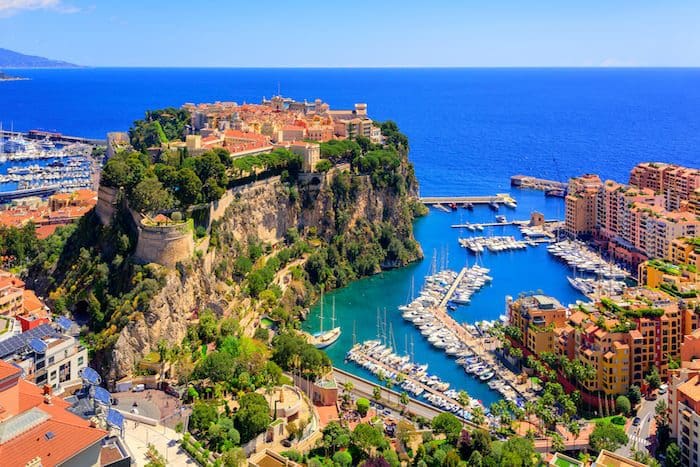
Europe’s very own non-theocratic microstate, Monaco, has no property taxes. However, like nearby Liechtenstein, be ready to pay for the pleasure of paying no property taxes.
Confused? Don’t be.
An absence of property taxes means Monaco’s glistening shoreline and luxurious homes, already a prime target for high-achieving entrepreneurs, have become even more attractive.
If you’re lucky enough to own a property there and wish to rent it out, be aware there’s a 1% tax, though it’s payable by the tenant. Overall, Monaco maintains its place among the list of countries with no taxes, making it a long-running favourite playground for the wealthy.
If you’re interested in finding out more about Monaco residency and citizenship, we have published a guide with all the details.
Malta
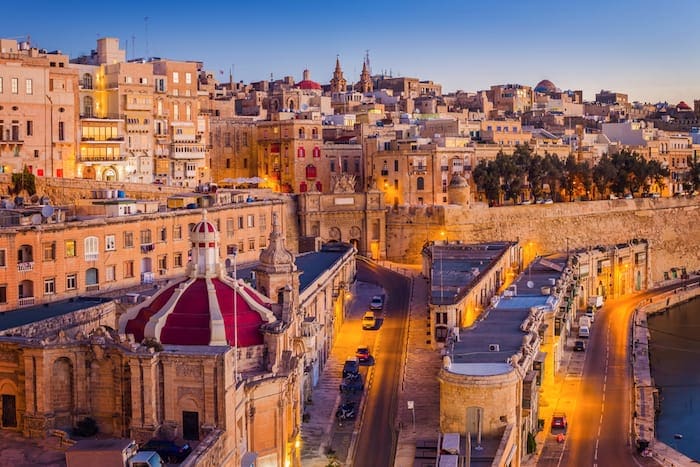
It’s particularly popular among expats as it’s a jurisdiction offering all the benefits of a European lifestyle plus powerful incentives for property owners and investors.
These benefits include a non-existent property tax, though the country does assess a stamp fee in lieu of property tax. Malta continues to gain the attention of many entrepreneurs who see EU residency and the potential of economic citizenship as a key part of their internationalisation plan.
Georgia
Thanks to its free economic policies and low taxes, Georgia is one of the most business-friendly countries in the world.
Our founder, Andrew Henderson, owns a number of properties in Georgia and hasn’t paid property taxes on any of them. In fact, most of the people we know who own property there do not pay property taxes.
However, there’s a caveat to this: if you make more than 40,000 Lari, about US$15,000, per year through Georgian-sourced income, then you’ll need to pay a small annual property tax of 1%.
For example, if your income exceeds that limit, you’ll have to pay about US$1,000 per year for a US$100,000 apartment. On the other hand, if you don’t have any Georgian-sourced income, then you won’t pay any property tax. An added benefit here is that Georgia doesn’t charge any kind of transfer tax or stamp duty.
Oceania
Outside of Europe, there are a few interesting countries with no property tax. Several of these are tropical island nations that might interest anyone looking to escape the daily grind.
Fiji
Fiji does not assess property tax on freehold land. Less than 10 per cent of all of Fiji is freehold land, much of it set aside by the British to entice farmers to come and create agricultural goods, but many people feel Fiji real estate is one of the best investments in the region.
Owning land in Fiji is a relatively straightforward way to get permanent residency there. Fiji also has a territorial tax system that allows residents to pay no tax on income earned outside of the country, such as through an offshore company.
This is a favourite real estate investment for many as it boasts competitive rates relative to the Pacific and is a major tourist destination.
Cook Islands
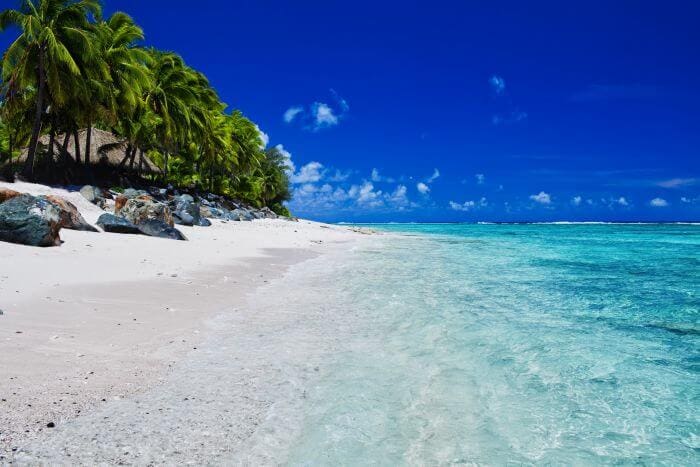
In addition to no wealth or capital gains taxes, the Cook Islands in the South Pacific doesn’t assess property taxes. This island chain, in free association with New Zealand, has gained attention for its asset-protection trusts and favourable no-property-tax policies.
However, land cannot be easily owned by foreigners in freehold form and, instead, the government requires property leases to be held by non-Cook Islanders with such leases maxing out at 60 years. This semi-sovereign island chain may become more important for real estate in the future but, for now at least, it may present too many challenges for foreign investors in spite of its ‘Pacific paradise’ draw.
Caribbean Region
Like Oceania, a number of island nations in the Caribbean have also foregone property taxes.
Cayman Islands
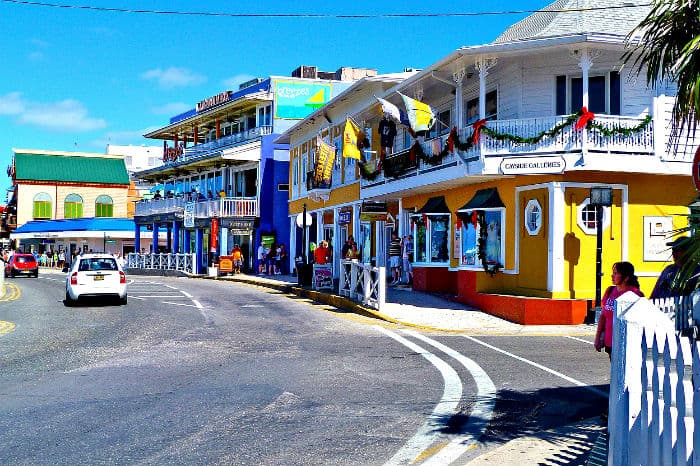
To no-one’s surprise, the Cayman Islands makes the list. Home to one of the world’s largest and most sophisticated offshore sectors, this is a no-income-tax and no-property-tax country.
The Cayman Islands is a longstanding name in the offshore world: no property taxes, no personal income taxes, no capital gains taxes, no corporate taxes, no payroll taxes and no withholding taxes on domestic or foreign entities.
In other words, the Cayman Islands is very friendly to nomadic investors who want to get a piece of this Caribbean property market.
Property prices seem to be rising – especially along the main areas of Seven Mile Beach – as a result of luxury developments and increased demand. These islands are among the most developed in the Caribbean, boasting excellent beaches and good business infrastructure, although the cost of living can be high here.
Dominica
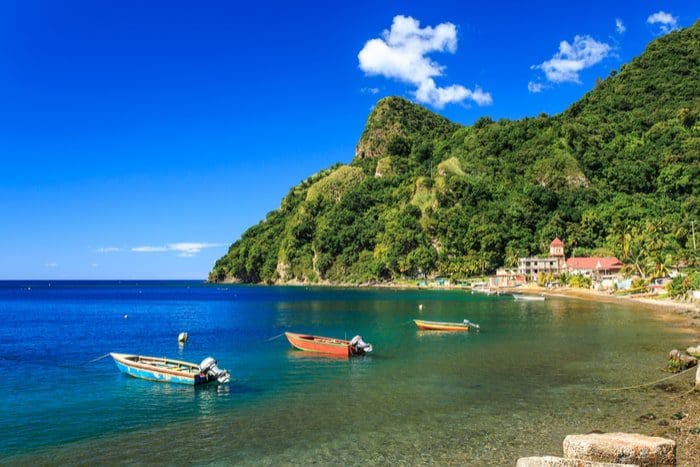
Dominica gained popularity among expats for its Citizenship by Investment (CBI) programme, but it’s also on our list of countries with no property tax.
Dominica has no property taxes and is a major contender in the second citizenship world, offering one of the most cost-effective CBI programs.
This Caribbean Island nation is known as the ‘nature island’ and is English-speaking, having obtained independence from the United Kingdom in 1978. One thing to note is that municipal taxes are levied on properties in Roseau and the Canefield urban areas, but otherwise, there are none of the traditional property taxes associated with most nations.
Turks & Caicos
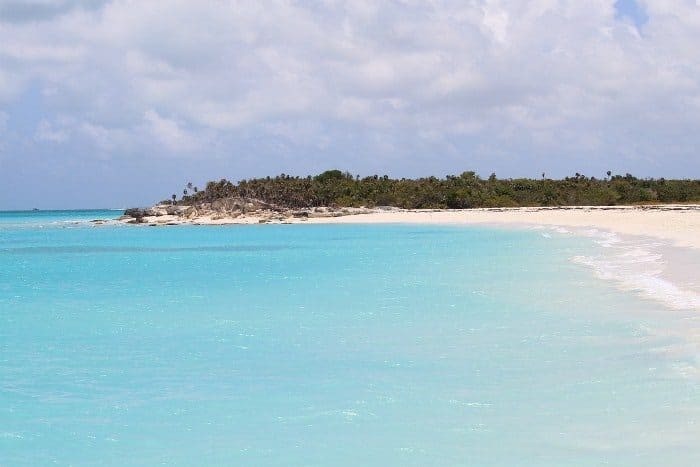
There is no property tax in the Turks & Caicos, but there is an annual stamp duty, which is on a progressive scale.
The Turks & Caicos Islands, a British Overseas Territory, is also on our list of 18 tax-free countries where you can get second residency and is generally worth considering, not only from a financial incentive standpoint but for the excellent lifestyle and quality of destination (especially beaches) that it offers.
The luxury real estate market is generally booming and many of our readers may be interested in the extra benefits of property there with regards to diversifying their residence or investment choices.
Asia & The Middle East
In Asia and the Middle East, you’ll find that certain rising markets and oil-rich countries with low tax rates tend to forego property tax.
United Arab Emirates (UAE)

The very name of Dubai conjures up the image of an exotic place where you can actually own your own home. The Middle East is also becoming known as a zero-tax region, with many countries there touting no income taxes.
Dubai is a ‘country’ with no property tax, although it does assess a one-time fee upon purchase of a property.
The UAE is home to some of the most innovative and impressive real estate projects (such as the world’s tallest building, largest mall) and is also arguably the most welcoming country in the Middle East regarding international investment and tax-free incentives.
Gulf Countries: Bahrain, Kuwait, Oman and Saudi Arabia
Other Middle Eastern countries like Bahrain, Kuwait, Oman and Saudi Arabia are all property tax-free as well. While many Westerners might not be paying as much attention to opportunities in this region, the extremely capitalist-friendly (and in some cases non-existent) tax codes here regarding property are appealing.
The region can create challenges for some foreigners regarding permissions or cultural adjustment in the case of residential property. Kuwait, for example, does not allow for foreign ownership except by other Gulf Cooperation Council (GCC) countries, and Saudi Arabia restricts non-Muslims from ownership in the holy cities of Medina and Mecca. Regardless, no property tax is a huge benefit for those looking to reduce their government burden.
Qatar
While there is no property tax in Qatar, you must realise that capital gains are taxed if they come from a business activity. So, if you’re an individual with a business activity, you will be taxed for capital gains.
The Catch: Stamp Taxes
But before you hop on a plane or dispatch a real estate agent to buy a home in a country with no property tax, you should consider another tax that governments frequently levy on property purchases – the stamp tax.
Some governments levy a stamp tax, which is also known as a real estate transfer tax, on all property purchases. Essentially, when you buy the property, you pay a percentage of the purchase price to the government as a stamp duty on the transfer of ownership.
Sometimes, this property transfer tax isn’t the worst thing in the world. When Nomad Capitalist founder, Andrew Henderson, bought an apartment in Malaysia, for instance, he paid a stamp duty of about 3% of the value of his purchase. While that raised his apartment’s initial price tag, he considered the charge well worth it, as it meant he only had to pay around $400 in property taxes per year.
In other countries, it may be a different story. When we investigated buying property in Barcelona, we initially found that real estate there was surprisingly cheap. However, as we dug deeper into the market, we came to realise why the property was so cheap – buyers had to pay an extra 8–10% in stamp taxes, on top of property taxes, to the Spanish government.
Of the 14 countries mentioned in this article, the following 10 levy a stamp duty on all property purchases:
- Monaco: 4.5–7.5%
- Malta: 5%
- Fiji: 3% for citizens; 10% for non-citizens
- Cayman Islands: 7.5%
- Dominica: 2% (seller); 4% (buyer)
- Turks & Caicos: 0-10%
- Seychelles: 5%
- Sri Lanka: 3–4%
- Bahrain: 1.7–2%
- Oman: 3%
As you can see, some of these stamp duties are rather token, whereas others can be quite substantial, so you’ll need to factor this into your decision on whether you make a real estate purchase in any of these countries.
However, since the stamp tax is a one-time payment, it can be a better deal than paying an annual property tax.
Conclusion
There are relatively few countries that truly have no property tax. Many have merely allowed property owners to pay a front-loaded sum in the form of a stamp tax or another fee that eliminates the need for never-ending property taxation.
Given a choice between two evils, we’d rather pay an up-front fee and be able to limit our costs going forward. You also need to consider if the presence of a significant stamp tax depresses prices slightly, as buyers are required to have more liquid cash up front.
We suspect many Westerners, used to putting 1.2 per cent down when buying real estate, would scoff at the idea of investing overseas for that reason. If you’re buying property for your own enjoyment or for yield, we imagine there may be some tiny benefit from an upfront tax.
At least in countries with no property taxes on an annual basis, you get to keep more of your own money. That’s something most governments don’t want you to do.
If you’re interested in high-yield and high-appreciation real estate opportunities, you can apply to become a client of Nomad Capitalist and we’ll help determine your best options as part of a personalised and completely legal offshore plan.








